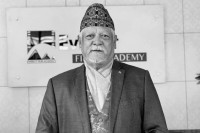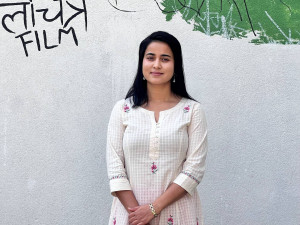Culture & Lifestyle
Numbers and narratives
For poet and economist Bhuwan Thapaliya, poetry is not an escape from the rational world of economics it is a way of understanding it.
Reeva Khanal
Bhuwan Thapaliya is a poet and economist based in Kathmandu. He is the author of five poetry collections, including ‘Safa Tempo: Poems New and Selected’ (2011) and his latest, ‘Slipping into Another World’ (2025). His work has appeared in numerous international journals and anthologies. It has been featured in global initiatives such as Stanford University’s Life in Quarantine and the UK Arts and Humanities Research Council’s Poetry and Covid project.
In this conversation with the Post’s Reeva Khanal, Thapaliya reflects on his journey as a writer, his professional and creative life, and how his experiences as a poet and economist shape his understanding of identity, culture, and Nepal’s evolving narrative.
Your poetry often explores themes of identity, nation, and personal reflection. What draws you to these subjects?
Identity is shaped by family, culture, place, and the stories we tell ourselves. Writing about it allows me to explore the tension between who we are, who we’re expected to be, and how we navigate our sense of self within society’s boundaries.
Similarly, nations are potent symbols that define collective and personal identities. They embody shared histories yet often conceal the diversity within—differences shaped by race, class, gender, and migration.
In my work, I’m drawn to how the idea of a nation—a literal country, a community, or an imagined homeland—intersects with personal narratives. Such explorations create space for reflection and critique, allowing me to examine the forces that shape us. These themes resonate deeply because they speak to the essence of being human, navigating our place in the world, and uncovering truths about ourselves, the societies we inhabit, and the histories we inherit.
You are an economist by profession and a poet by passion. How do these two worlds intersect?
These two worlds enrich one another in surprising ways. Economics examines how people make choices and how societies manage scarcity and abundance—it is structured, analytical, and data-driven. Poetry, in contrast, engages with the emotional and intangible, capturing moments and truths that elude any model or equation.
Despite their differences, both seek to understand the human condition. Economics offers a framework to analyse the systems shaping our lives, while poetry gives voice to the individual experience within those systems—the human story behind the numbers. Together, they allow me to engage with the world through an analytical and human lens.
How have your travels influenced your understanding of Nepal and your literary voice?
Exposure to diverse cultures and perspectives has expanded my worldview, allowing me to see Nepal both from within and through the eyes of others. This duality has deepened my appreciation of the country’s beauty, challenges, and complexities.
Living and travelling abroad has also made me more conscious of Nepal’s place in the global narrative. It has inspired me to explore how our cultural heritage connects with broader global themes, blending the personal with the universal. I now write not only as someone who knows Nepal intimately but also as one who sees it in dialogue with the world—its struggles, contradictions, and quiet resilience. This perspective widens the emotional and intellectual scope of my work, allowing it to speak to both local and international audiences.
Your poems often balance nostalgia, hope, and social commentary. How do you approach blending personal and collective experiences in your writing?
I see nostalgia as a bridge between the personal and the collective—connecting my memories with broader cultural and historical narratives. It’s less about longing for the past and more about understanding how the past continues to shape the present.
Hope grows from that same space. It isn’t merely an individual emotion but a collective force born from endurance and renewal. I try to root hope in lived experiences—the quiet resilience of people who rebuild and persist.
Social commentary ties these threads together. It reflects how political, economic, and cultural forces influence everyday lives, often invisibly yet profoundly. For me, the personal and political are inseparable; the struggles of communities and the realities of a nation in flux are deeply personal. Through my writing, I seek to give voice to these experiences, revealing truths, creating connections, and challenging silence.
What advice would you give to young writers in Nepal about using literature to express cultural, personal, or societal truths?
To young writers, I would say: embrace the power of your voice. Literature is a tool for expressing personal, cultural, and societal truths. Speak your truth, even when it feels uncomfortable or challenges others, for writing should provoke thought and reflection.
Nepal is diverse in geography, people, languages, and histories. There is no single Nepali experience, so write from your unique perspective while appreciating the multiplicity of voices around you. Honour your truth while remaining open to others, and you will contribute to a richer, more inclusive literary landscape.
Exploring personal truths through poetry allows intimate self-reflection. Vulnerability can create deep connections with readers and make your experiences resonate on a broader scale. Similarly, writing about societal contradictions, joys, struggles, and hopes reflects the lived realities of communities and can shape public discourse.
Finally, experiment with form, language, and imagery. Your writing need not fit in a box; it can be wild, precise, fragmented, or structured. The world needs voices that are true to themselves. Hold on to that truth—your words matter, building bridges, expressing the unspoken, and reflecting the complex beauty of identity, culture, and society.
Bhuwan Thapaliya’s five book recommendations
Dust Child
Author: Nguyẽn Phan Quẽ Mai
Publisher: Algonquin Books
Year: 2023
Set against the backdrop of Vietnam’s turbulent history, this novel captures the effects of war on individuals and societies.
Annapurna Poems
Author: Yuyutsu RD Sharma
Publisher: Nirala Publications
Year: 2012
The poet’s devotion to sacred landscapes goes beyond physical terrain. They serve as a source of creative inspiration.
Confessions of an Economic Hit Man
Author: John Perkins
Publisher: Berrett-Koehler Publishers
Year: 2004
The book’s narrative exposes uncomfortable truths, illuminating the forces that manipulate and undermine power systems.
The Idea of Justice
Author: Amartya Sen
Publisher: Penguin, UK
Year: 2009
Sen challenges conventional thinking, urging us to move beyond idealised theories and focus on addressing urgent issues.
The Prophet
Author: Kahlil Gibran
Publisher: Alfred A Knopf
Year: 1923
‘The Prophet’ speaks to the soul, reminding us to live with mindfulness, love, understanding, joy, and purpose.




 9.12°C Kathmandu
9.12°C Kathmandu















